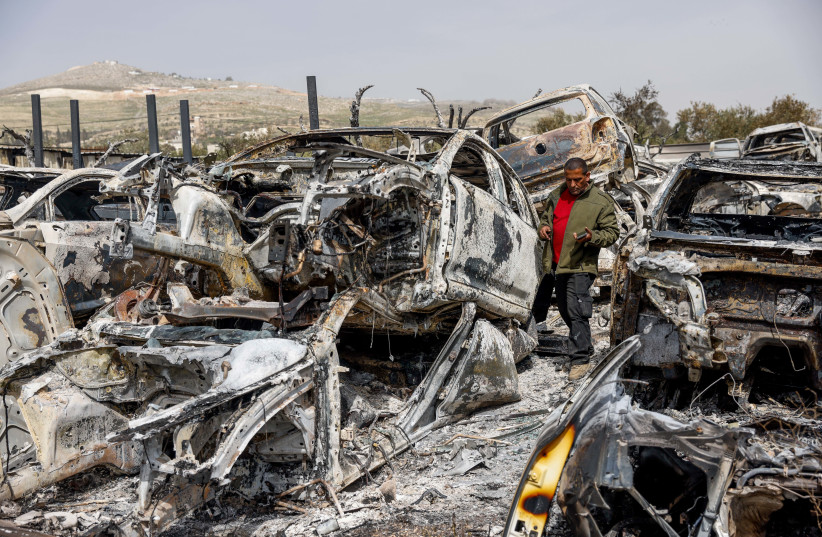Settler violence is “causing an enormous amount of pain,” United States Ambassador to Israel Tom Nides said as he joined the international condemnation against the Jewish vigilante rampage in the Palestinian town of Huwara in which dozens of homes and cars were torched.
“I do not think any Israeli would be proud to see settlers burning cars and smashing windows, that doesn’t make any of us proud or happy under any circumstance,” Nides said when he spoke briefly at Tel Aviv University’s Institute for National Security Studies, just two days after the attack, during which a Palestinian man was killed.
Nides underscored the imperative of preventing further violence, particularly as emotions rise during the month of Ramadan, which begins on March 22.
“This is going to be a very complicated period of time we are about ready to walk into, we have to keep things as calm as possible, to keep things from going out of control, which can easily happen,” he said.
US envoy Hady Amr visits Huwara
Hours earlier State Department’s Special Representative for Palestinian Affairs Hady Amr visited Huwara and called for Israel to take action against vigilante attacks.

“We want to see full accountability and legal prosecution of those responsible for these heinous attacks and compensation for those who lost property or were otherwise affected,” Amr said.
He expressed his condolences and “condemned the unacceptable wide-scale, indiscriminate violence by settlers,” the US Office of Palestinian Affairs stated after the visit.
Fatah Deputy Chairman Mahmoud Aloul told Amr that international protection was needed to keep Palestinians safe.
"We are counting on the role of the US administration in stopping violence in the region,” Aloul said according to the Palestinian news agency WAFA.
Amr also visited the Temple Mount, known to Muslims as al-Haram, al-Sharif, to affirm the Biden administration’s commitment to the status quo and to discuss ways to ensure a peaceful Ramadan.
In New York, the United Nations Security Council was expected to hold closed-door consolations on the Huwara attack.
The European Union’s foreign policy chief Josep Borrell also condemned both the Huwara attack and Palestinian terror attacks, stating that he had spoken with both Israeli and Palestinian officials about the need to restore calm.
Germany's Baerbock condemns Palestinian terror, Israeli settler rampage
German Foreign Minister Annalena Baerbock expressed her concern when she meet with her Israeli counterpart Eli Cohen in Berlin on Tuesday.
“Our sympathy...goes out to the victims of the revenge actions, the retaliatory actions in the city of Huwara Houses and cars were set alight, innocent families were left in a state of shock and fear,” Baerbock said,
She sharply condemned the two Palestinian terror attacks in the West Bank on Sunday and Monday that claimed three Israeli lives, stating they were “murdered because they were Israeli, because they were in the wrong place at the wrong time. There can never be a justification for such terror.
But Baerbock also spoke out against the retaliatory attack against Huwara on Sunday night, during which a Palestinian man was killed.
“Such acts of retaliation and revenge have further aggravated the already tense situation and the responsible people have to be brought to justice. There has to be a chance an opportunity for justice to be done,” Baerbock said.
Cohen arrived in Germany just two days after the Aqaba summit, which was a unique meeting in which officials from five governments — the Palestinian Authority, Israel, Jordan, Egypt and the United States — met to discuss the deteriorating security situation in east Jerusalem, the West Bank and Gaza.
Baerbock called for a negotiated end to the conflict and affirmed her support for a two-state resolution to the conflict, noting that this was in Israel’s best security interest.
“We are not native. Such a solution is not about to happen any time soon, but we are convinced that this door ought to be kept open instead of being bricked up by one sided steps being taken such as the continuation of building settlements,” she said,
Such settlement construction is illegal under international law and is an impediment to peace and security, she said, adding that what was needed now was security cooperation between Israelis and Palestinians and confidence-building measures.
Cohen pushed back at the issue of settlement building and repeated Prime Minister Benjamin Netanyahu's statement that Israel has not agreed to freeze the construction of settler homes.
“The Israeli government always built in Judea and Samaria. Even the previous government, when there were Arab parties in the coalition, also built in Judea and Samaria, so we will continue to build there,” he said.
Cohen condemned the Huwara attack but underscored the Palestinian Authority policy of providing monthly financial stipends to terrorists and their families.
The Palestinian Authority is the only government “in the world” from whom “you receive a payment when you kill a Jewish guy,” he said, as he encouraged Baerbock to pressure the PA to stop those payments.
